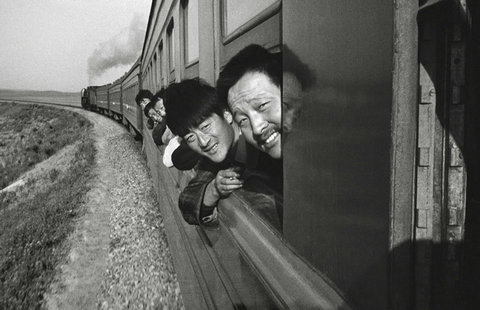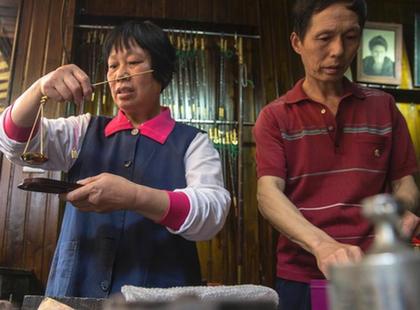Ho Feng Shan: A man of compassion, courage
Updated: 2015-04-24 11:18
By May Zhou(China Daily USA)
|
||||||||
 |
|
Ho Feng Shan and daughter Ho Manli in 1977. Provided to China Daily |
Shanghai impact
Ho's impact, however, extended well beyond Austria and the recipients of his visas; his actions put Shanghai on the map and into the consciousness of Jews in other Nazi occupied territories as a refuge of last resort.
As a result, from 1938 to 1940, some 18,000 European Jewish refugees fled to Shanghai to escape certain death at the hands of the Nazis.
That's why Nancy Li, Houston, chair of the US-China Peoples Friendship Association and trustee of the HMH, became instrumental in nominating Ho as an honoree.
"When it comes to the history of WWII, very little research has been conducted about China in the West. Through events like this, I hope to raise awareness that China suffered at the hands of the Japanese just as Jews suffered at the hands of the Nazis. Moreover, even while China suffered under Japanese occupation, Chinese like Dr Ho were willing to extend a helping hand toward the Jews in Europe," said Li.
Mark Mucasey, chair of the HMH, said the nomination of Ho stemmed from his visit to China in 2013 to attend the conference of the Association of Holocaust Organizations.
While there, Mucasey visited Unit 731 Museum. "It showed the atrocities of the Nanjing Massacre and chemical warfare and medical experiments conducted by the Japanese," he said.
"We turned a corner and there it was, an oven where the bodies were burned. It looked exactly like the oven in Auschwitz, Poland, which I had just visited. This was the same appliance and the same cruelty. This is what the Germans were doing to the Jews and what the Japanese were doing to Chinese," Mucasey added.
Mucasey and his group also visited the Shanghai Ghetto. "We saw where they (Jews) escaped the ravages of Europe," he said. "All these were new to us, and based on what we learned, we decided to honor Ho, and reach out to our Asian neighbors."
Yet while Ho Feng Shan was alive, nobody, not even his family, was aware of the scope of what he had done. After his death, his daughter, Ho Manli, a journalist by training, began an 18-year odyssey to uncover the history of her father's deeds.
"I began this search by chance, shortly after my father's death in 1997," Ho Manli said. "But, by doing so more than six decades later means that we shall never know the full extent of his humanitarian efforts."
Trying to retrace the history, she said, was "like looking for a pebble in the ocean."
"There was no 'Schindler's List' of survivors. The survivors had scattered all over the world. Most of the adults who lined up in front of the Chinese Consulate to obtain visas are no longer with us, and did not necessarily tell their children the details of how the family escaped," Ho Manli said.
After the end of the World War II, China was plunged into a civil war. There were few Chinese archival documents left to be found, she added.
- Fourth generation of 'face-kini' soon to hit beach in Qingdao
- Tibetan town captures photos of their 'panda deity'
- 600 arrested in Beijing's vice crackdown
- Building collapse in Guizhou caused by landslide: govt
- Xi welcomes Japan delegation but warns against historical distortion
- Chinese Vice-Premier stresses flood control
- Ireland becomes first country to vote for equal marriage: PM
- Gov't declares high alert after landslide blocks Kali Gandaki River in Nepal
- Restorers give shape to Pompeii victims
- China, Russia end joint naval exercises
- Japanese visit underlines thaw in relations
- China, Brazil cooperation can ride 'winds and tides'

 Premier talks with Chinese entrepreneurs in Peru
Premier talks with Chinese entrepreneurs in Peru
 Tourists enjoy themselves at Mingsha Hill desert
Tourists enjoy themselves at Mingsha Hill desert
 Colombia: A birdwatcher's paradise
Colombia: A birdwatcher's paradise
 Journey of a migrant girl from village to ad world
Journey of a migrant girl from village to ad world
 Photographer captures Chinese on the train
Photographer captures Chinese on the train
 Hou Hsiao-Hsien's The Assassin premieres in Cannes
Hou Hsiao-Hsien's The Assassin premieres in Cannes
 Top 10 highest-paid white-collar jobs in China
Top 10 highest-paid white-collar jobs in China
 The dying craft of balance scales
The dying craft of balance scales
Most Viewed
Editor's Picks

|

|

|

|

|

|
Today's Top News
Chinese premier arrives in Chile for official visit
Expansion of free trade possible on Chile visit
Chilean president sees promising prospects for relations with China
Chinese premier encourages firms to upgrade cooperation with Peru
China, Peru agree on feasibility study on transoceanic railway
China manufactures first
car for US market
Wisconsin hopes to make cheeseheads in China
China, Peru to diversify trade focus
US Weekly

|

|







